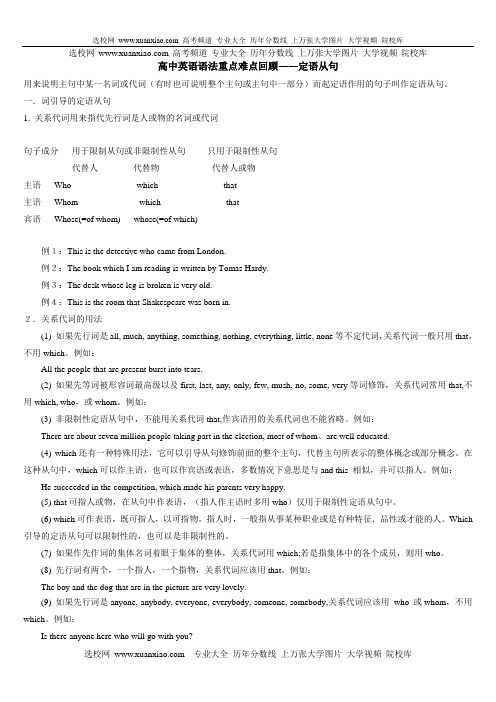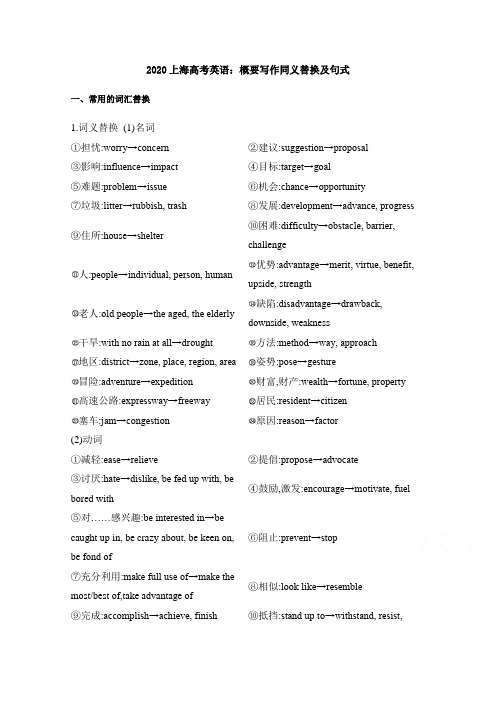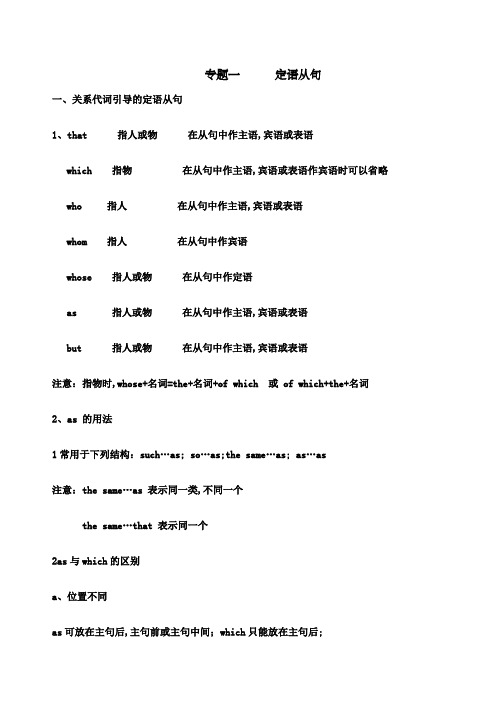【精品整理】2020年高考英语新题型写作技巧四 定语从句和写作同义词总结
超实用高考英语专题复习:专题04定语从句——考试必备考点归纳与测试(通用版)

必过04 定语从句距离高考还有一段时间,不少有经验的老师都会提醒考生,愈是临近高考,能否咬紧牙关、学会自我调节,态度是否主动积极,安排是否科学合理,能不能保持良好的心态、以饱满的情绪迎接挑战,其效果往往大不一样。
以下是本人从事10多年教学经验总结出的以下学习资料,希望可以帮助大家提高答题的正确率,希望对你有所帮助,有志者事竟成!养成良好的答题习惯,是决定高考英语成败的决定性因素之一。
做题前,要认真阅读题目要求、题干和选项,并对答案内容作出合理预测;答题时,切忌跟着感觉走,最好按照题目序号来做,不会的或存在疑问的,要做好标记,要善于发现,找到题目的题眼所在,规范答题,书写工整;答题完毕时,要认真检查,查漏补缺,纠正错误。
总之,在最后的复习阶段,学生们不要加大练习量。
在这个时候,学生要尽快找到适合自己的答题方式,最重要的是以平常心去面对考试。
英语最后的复习要树立信心,考试的时候遇到难题要想“别人也难”,遇到容易的则要想“细心审题”。
越到最后,考生越要回归基础,单词最好再梳理一遍,这样有利于提高阅读理解的效率。
另附高考复习方法和考前30天冲刺复习方法。
定语从句是高考的热点,主要考查关系代词和关系副词的正确运用,特别是它们在非限制性定语从句中的运用。
主要考点有:①关系代词which引导的非限制性定语从句②关系副词where引导的定语从句(近三年来常考查先行词是表示抽象空间念的名词的情况)③介词+关系代词引导的非限制性定语从句;as引导的非限制性定语从句。
关系代词Each graduate standing on the playground, who was accompanied by a parent, would be awarded a diploma by the headmaster.每个毕业生都由父亲或母亲陪伴着站在操场上,等待校长给他们颁发毕业文凭。
My daughter, whose job requires her to do a lot of travelling, is always away from home.我的女儿总不在家,她的工作需要经常出差。
高中英语写作方法指导-定语从句的写作

I often think about the times ________________ and sometimes even from acquaintances.
答案 1.which should not be missed 2.without whose help 3.as is shown in the report 4.where you live 5.when I have felt hurt and insulted by rude remarks from strangers
Ⅱ.请按以下内容要点写一篇有关你的同学 Kate 的英 语短文,尽可能多地使用定语从句。
1.我有一个同学叫 Kate,她的妈妈是我以前的英语老 师。
2.Kate 是一个容易相处的人,我们都喜欢她。 3.Kate 在此次口语竞赛中获得第一名,这使得她妈妈 很高兴。
4.新年就要到了,到时 Kate 会和她妈妈一起去香港。 5.众所周知,香港是一个购物天堂,Kate 打算在那里 买她需要的东西。 ___________________________________________________ ___________________________________________________
答案 1.wt
三、定语从句写作的几点注意事项 1.误用关系词 误:I live in Beijing, where is the capital of China. 正:I live in Beijing, which is the capital of China. 误:I have a friend, who's name is Liu Mei. 正:I have a friend, whose name is Liu Mei.
高中英语语法定语从句总结

选校网高考频道专业大全历年分数线上万张大学图片大学视频院校库高中英语语法重点难点回顾――定语从句用来说明主句中某一名词或代词(有时也可说明整个主句或主句中一部分)而起定语作用的句子叫作定语从句。
一.词引导的定语从句1. 关系代词用来指代先行词是人或物的名词或代词句子成分用于限制从句或非限制性从句只用于限制性从句代替人代替物代替人或物主语Who which that主语Whom which that宾语Whose(=of whom) whose(=of which)例1:This is the detective who came from London.例2:The book which I am reading is written by Tomas Hardy.例3:The desk whose leg is broken is very old.例4:This is the room that Shakespeare was born in.2.关系代词的用法(1) 如果先行词是all, much, anything, something, nothing, everything, little, none等不定代词,关系代词一般只用that,不用which。
例如:All the people that are present burst into tears.(2) 如果先等词被形容词最高级以及first, last, any, only, few, mush, no, some, very等词修饰,关系代词常用that,不用which, who,或whom。
例如:(3) 非限制性定语从句中,不能用关系代词that,作宾语用的关系代词也不能省略。
例如:There are about seven million people taking part in the election, most of whom、are well educated.(4) which还有一种特殊用法,它可以引导从句修饰前面的整个主句,代替主句所表示的整体概念或部分概念。
2020最新高中英语语法—定语从句

定语从句1. 定语从句的概念。
在句子中起定语作用的从句成为定语从句,定语从句在句子中的作用相当于形容词,所以又成为形容词性从句。
2. 定语从句的构成。
定语从句中,被定语从句修饰的词叫先行词;指代先行词,放在先行词和定 语从句之间起连接作用,同时又充当定语从句的某个成分的词叫关系词(又 分为关系代词和关系副词)。
3. 关系代词引导的定语从句。
关系代词在句中起连接、替代的作用,充当一定的成分,它的人称、数必须和先行词保持一直。
A. that 引导的定语从句that 既可以指人,也可以指物,指人时可与who, whom 互换;指物时可与which 互换。
that 在定语从句中作主语、宾语、表语,作宾语时可以省略。
The city has tall buildings that are close to each other.注:that 作介词宾语时,介词不能提到that 之前;若介词提前,指人时用whom ,指物时用which 。
He is the person to whom you should write.B. which 引导的定语从句which 一般指物,在定语从句中作主语/宾语等。
在句中作主语时,which 不能省略;作宾语时,可以省略(放在介词后除外)。
C. who/whom 引导的定语从句两者都用于指人,who 在句中作主语/宾语/表语;whom 在句中作宾语。
作宾语时,who/whom 可以省略(放在介词后除外)。
注:定语从句中作宾语的关系代词whom 可以用who 来代替,但当whom 在定语从句中作介词的宾语,且介词提到whom 前面时,不能用who 代替。
The woman to whom I just talked is Mary. =The woman who/whom I just talked to is mary.注:先行词为one, ones, anyone, those 时,指人的关系代词用who ;双重定语从句中,当一个定语从句的关系代词是that 时,另一个人指人的关系代词也要用who 。
高考英语定语从句用法归纳及注意事项大全

高考英语定语从句用法及注意事项一、关系代词引导的定语从句1、that指人或物在从句中作主语,宾语或表语which指物在从句中作主语,宾语或表语(作宾语时可以省略)who指人在从句中作主语,宾语或表语whom指人在从句中作宾语whose指人或物在从句中作定语as指人或物在从句中作主语,宾语或表语but指人或物在从句中作主语,宾语或表语注意:指物时,whose+名词=the+名词+ofwhich或ofwhich+the+名词2、as的用法(1)常用于下列结构:such…as;so…as;thesame…as;as…as注意:thesame…as表示同一类,不同一个thesame…that表示同一个(2)as与which的区别a、位置不同as可放在主句后,主句前或主句中间;which只能放在主句后。
b、as起连接作用,表达说话人的观点、看法,并指出主句内容的根据或出处,意为“正如,正像”。
Which相当于并列句,可以用andthis来代替,意为“这一点,这件事’”。
注意:as常用于下列结构:asweknow/asisknowntoall,asweallcansee,ashasbeensaidbefore/above, asmightbeexcepted,asisoftenthecase,一般不能用which代替as。
c、在从句中作主语时,which既可作系动词be的主语也可作实义动词的主语,而as只可作系动词be的主语。
二、只用that不用which的情况1、先行词为all,much,everything,nothing,something,anything,nothing,none,theo ne等不定代词时。
2、先行词被only,any,few,little,no,all,just,very,right等修饰时。
3、当先行词是最高级或被形容词最高级修饰时。
4、当先行词是序数词或被序数词修饰时。
5、当先行词是数词时。
2020年上海高考英语概要写作同义替换和句式

2020上海高考英语:概要写作同义替换及句式一、常用的词汇替换1.词义替换(1)名词①担忧:worry→concern②建议:suggestion→proposal③影响:influence→impact④目标:target→goal⑤难题:problem→issue⑥机会:chance→opportunity⑦垃圾:litter→rubbish, trash⑧发展:development→advance, progress⑨住所:house→shelter ⑩困难:difficulty→obstacle, barrier, challenge人:people→individual, person, human优势:advantage→merit, virtue, benefit, upside, strength老人:old people→the aged, the elderly缺陷:disadvantage→drawback, downside, weakness干旱:with no rain at all→dr ought 方法:method→way, approach地区:district→zone, place, region, area 姿势:pose→gesture冒险:adventure→expedition 财富,财产:wealth→fortune, property 高速公路:expressway→freeway 居民:resident→citizen塞车:jam→congestion 原因:reason→factor(2)动词①减轻:ease→relieve②提倡:propose→advocate③讨厌:hate→dislike, be fed up with, bebored with④鼓励,激发:encourage→motivate, fuel⑤对……感兴趣:be interested in→becaught up in, be crazy about, be keen on,be fond of⑥阻止:prevent→stop⑦充分利用:make full use of→make themost/best of,take advantage of⑧相似:look like→resemble⑨完成:accomplish→achieve, finish⑩抵挡:stand up to→withstand, resist,oppose处理:deal with→handle采取措施:take action→take measures, take steps加速:speed up→accelerate出发去某地:set off for→head for, leave for经历:undergo→experien ce降低至:fall to→decline to, decrease to, drop to要求:request→demand, require消除:clear→eliminate, remove确保:ensure→assure, guarantee, makesure宣称:declare→claim给予:give→offer, provide, supply保持:keep→preserve, reserve, maintain 导致:lead to→cause, g ive rise to, resultin暴露:reveal→expose使:make→enable提高:improve→enhance改变:change→transform, alter与……联系:associate with→connect with建立:build→establish, set up得到:get→acquire, obtain拥有:have→possess, own感谢:thank→appreciate表达:express→conve y 解决:solve→cope with, deal with, resolve 帮助:help→assist, aid步行:walk→cover确信:make sure→ensure认为:think→claim, consider, believe, insist, hold损害:damage→hurt, injure, harm,impair, endanger保护:protect→conserve, preserve致力于:be devoted to→be com mittedto展示:show→reveal, illustrate, present 允许某人做某事:give sb. permission todo sth.→allow sb. to do sth.预订:book→reserve推迟:put off→delay转换:switch→convert, transform禁止:forbid→ban, prohibit 区分:tell sth./sb. apart→distinguish 由……构成:be made up of→becomposed of, consist of维持:sustain→support, maintain承担责任:shoulder/undertake one'sduty→be responsible for, takeresponsibility增加:be on the rise→increase, multiply 尽力做某事:do sth. to the best of one'sability→try one's best to do sth., spare no effort to do sth., make every effort to do sth.专心致志于:put one's heart into→be absorbed in, be bent on, be buried in(3)形容词①乏味的:boring→dull, tiresome②害怕的:afraid→frightened, scared③出名的:famous→notable, renowned ④显然的:obvious→apparent, evident, clear⑤严重的:severe→serious ⑥有益的:useful→helpful, beneficial, profitable, rewarding⑦新的:new→fresh, brand new, novel⑧粗鲁的:rude→impolite ⑨怀疑的:doubtful→skeptical,suspicious, incredulous⑩快速的:fast→speedy最便宜的:the least expensive→the cheapest许多:many→a sea of, an oce an of, abundant, numerous, considerable巨大的:big→enormous, vast, massive, tremendous聪明的:clever→smart, gifted, sharp-minded好的:good→fantastic, magnificent,outstanding, remarkable穷的:in poverty→poor, needy悲伤的:sad→depressed, frustrated重要的:importan t→significant, essential, critical, vital, crucial基本的:fundamental→basic, essential 神圣的:sacred→holy充足的;富裕;富有:rich in→plentiful, 少量的:a small number of→a handful ofample, generous, abundant主要的:primary→main合理的:reasonable→sensible, rational, sound勇敢的:brave→fearless, bold,courageous开心的:happy→cheerful, delightful 艰难的:difficult→tough, challenging 有害的:harmful→damaging, ruinous 传统的:traditional→conventional 生气的:angry→annoyed, irritated最初的:initial→original 疲劳的:worn→tired, exhausted(4)副词①非常:very→extremely, intensely,extraordinarily②最后:finally→eventually, ultimately③起先:firstly→originally, initially ④大约:approximately→almost, about, around, nearly, roughly⑤肯定地:certainly→definitely, undoubtedly, obviously, apparently ⑥经常,总是:frequently→c onstantly, always⑦立刻:right now→immediately, shortly, right away ⑧事实上:as a matter of fact→practically, in practice, in reality, in effect, in fact⑨平稳地:steadily→smoothly ⑩决不,从不:never→on no account, at no time, under no circumstances偶尔,有时:now and then→at times,occasionally很少:rarely→seldom每天:day in and day out→every day 缓慢地,轻微地:slightly→slowly, mildly 仅仅:only→merely 完全地:totally→absolutely, completely 目前:at present→nowadays, recently 急剧地:dramatically→sharply, steeply(5)其他替换①我认为:in my opini on→personally,from my perspective②关于:with regard to→as for③虽然:despite/regardless the factthat→although④同时:at the same time→meanwhile⑤同时:at the same time→in the meantime ⑥因为:on account of the fact that→because⑦对比:on the other hand→by contrast, on the contrary ⑧此外:in addition→besides, furthermore, moreover2.词性转换①追求:pursue v.→pursuit n.②受伤:injure v.→injured adj.受伤的→injury n.受伤③重要的:important adj.→be ofimportance n.④受欢迎:popular adj.→popularity n.⑤强调:put an emphasis onn.→emphasize v.⑥更喜欢:pre fer v.→preference n.⑦讨论:have a discussion of n.→discussv.⑧缺乏:a lack of n.→lack v.⑨比较:comparison n.→compare v.⑩倾向于:have a tendency to do n.→tend to do v.需要:have a need for n.→need v.调查:conduct an investigation n.→investigate v.决定:make a decis ion n.→decide v.解释:give an explanation of n.→explain v.创造性:creativity n.→creative adj.各种不同的:a variety of n.→various adj.评估:assess v.→assessment n.指派,布置作业:assign v.→assignment n.方便:convenience n.→convenient adj.辨别:distinguish v.→distinguish ed adj.突出的评估:evaluate v.→evaluation n.使烦恼:annoy v.→annoying adj.令人烦恼的→annoyance n.烦恼二、常用的写作句式(一) 提出建议的句型I suggest that… Why not do…? Why don’t you do…?You would better do/ not do… If I were you,I would……It seems to me that you could…… You may consider doing…I feel that it would be beneficial if… You may consider doing…I think it would be more beneficial if you could……As you may agree that I would like to suggest that…(二) 结尾常用格式I hope that my suggestions are helpful for your decision-making anyway.I would be more than happy to see improvement in this regard.I believe that you will take my suggestions into serious account.I would be ready to discuss about this matter with you to further details.Whatever you decide to do,good luck with your studies/work!(三) 连接词1.Firstly:previously, initially, foremost(adv,第一adj.最重要的)2.Generally: principally, mainly, basically, fundamentally,3.Then:subsequently(随后陆续的), afterward(时间上的), thereafter(逻辑上的), secondarily, furthermorestly:ultimately, eventually, in conclusion, as a final point, last but not least,5.Too: in addition, besides, moreover, additionally6.And: plus, as well as, along with, in addition7.Or: otherwise, if not, before, or else8.So (adv): therefore, thus, consequently, accordingly,9.Because: as, due to, since, as to, in that, for the reason that, for, now that10.But: however, moreover, nevertheless, nonetheless, on the contrary, even if, while, despite the fact that11.Only: just, merely, barely, singly, solely, rarely12.Very: extremely, acutely, decidedly, deeply, exceedingly, greatly, highly,13. Actually: as a matter of fact, indeed, literally, truly14. Important: essential, significant, vital, crucial, profound, play a pushing, requisite, critical, fundamental, primary, elementary, underlying, rudimentary, basically, necessary…EXAMPLE:(1)A is important to B.(2)A plays an/a important role to B(3)A is of (great\enormous\significant\awesome) to B.(4)A means (a lot\a great deal\much) to B.(5)The importance of A (to B) can never be (denied\ignored\doubted).(6)Nothing is more crucial to B than A.(7)A is to B what the foundation is to a skyscraper.15.difficult: demanding(劳神费力的),laborious(艰苦的),formidable(艰巨的)16.many: numerous, myriad, infinite,quantities of a (large) number of / (large) numbers of + 可数名词复数plenty of +可数名词复数/不可数名词 a good/great many + 可数名词复a large/huge amount of / large amounts of + 不可数many a + 可数名词单数Small: minimum, diminutive, minute, petite, wee, undersized, teeny, tiny,17.little:petite(女子身高娇小)18.bad: adverse(不利的), negative19.good: excellent, outstanding, extraordinary, remarkable20.Big: massive, enormous, tremendous, giant, vast, large, huge, bulky,21.boring; dull, tiresome, tedious(乏味的)ep: He that can read and meditate will not find his evenings long or life tedious.22.worried: anxious, apprehensive, fraught23.sad: depressed(无望的,失落的) ;gloomy(情绪低落的)ep: She felt very depressed about the future.ep: They found him in gloomy, downbeat mood.24.frustrated(沮丧的)ep: Both sides appeared very frustrated at the lack of progress.25.famous: renownedep: The region is renowned for its outstanding natural beauty.26.notable:noticeableep: The book stands out as one of the notable landmarks in the progress of modern science.)27.abundant: ample, plentiful, generous28.different: various, a variety of, diversemon: universal, pervasive(普遍的,普通的)30.doubted: skeptical, suspicious(怀疑的)ep: Most organizations are, quite understandably, suspicious of new ideas.31.interesting: amusing, entertaining, engaging32.brave: courageous, bold, fearless33.reasonable: sound, rational, sensible34.poor=needy35.rich=wealthy36.Without:excluding。
高考英语语法知识点总结

专题一定语从句一、关系代词引导的定语从句1、that 指人或物在从句中作主语,宾语或表语which 指物在从句中作主语,宾语或表语作宾语时可以省略who 指人在从句中作主语,宾语或表语whom 指人在从句中作宾语whose 指人或物在从句中作定语as 指人或物在从句中作主语,宾语或表语but 指人或物在从句中作主语,宾语或表语注意:指物时,whose+名词=the+名词+of which 或 of which+the+名词2、as 的用法1常用于下列结构:such…as; so…as;the same…as; as…as注意:the same…as 表示同一类,不同一个the same…that 表示同一个2as与which的区别a、位置不同as可放在主句后,主句前或主句中间;which只能放在主句后;b、as起连接作用,表达说话人的观点、看法,并指出主句内容的根据或出处,意为“正如,正像”; Which相当于并列句,可以用and this来代替,意为“这一点,这件事’”;注意:as常用于下列结构:as we know/ as is known to all, as we all can see, as has been said before/above,as might be excepted, as is often the case, 一般不能用which代替as;C、在从句中作主语时,which既可作系动词be的主语也可作实义动词的主语,而as只可作系动词be的主语;3、but用作关系代词,相当于who/that…not例:In China there is no one but knows Lei Feng.二、只用that不用which的情况1、.先行词为 all , much, everything, nothing , something ,anything, nothing, none, the one等不定代词时2、先行词被only, any, few, little, no , all, just , very ,right等修饰时.3、当先行词是最高级或被形容词最高级修饰时;4、当先行词是序数词或被序数词修饰时;5、当先行词是数词时.6、当先行词既指人又指物时;7、如有两个定语从句,其中一个关系代词已用which,另一个关系代词则宜用 that;8、主句是There be结构,修饰其主语的定语从句宜用that 作关系代词;9、被修饰成分为表语,或者关系代词本身是定语从句的表语时,该关系代词宜用that;10、先行词为what,关系代词用that;11、有时为了避免重复而使用that引导定语从句;三、只用which不用that的情况1、当介词放在关系代词之前时;2、在非限制性定语从句中;3、当关系代词指整个主句的概念时;四、只用who不用that的情况1、当先行词是one, ones,anyone或those时;2、there be 结构中;3、当先行词是人,后面有较长修饰语时;4、为了避免重复或引起歧义;5、当先行词是I,you,he,they等时常用于谚语中;6、先行词是指成员的集体名词;7、who可以引导非限制性定语从句;8、先行词是拟人化的名词;9、先行词指特定的人时用who,不指特定的人用that;五、关系副词引导的定语从句1、when 时间状语注意:It/Ihis/That + be + the first/ second/ last time that…只能用that,that可以省略,从句用相应的完成时;2、where 地点状语注意:当先行词为模糊的地点时,如point. Situation, case, position, stage, scene, spot, activity, family, job等名词时用where.3、why 原因状语先行词为reason;六、介词与关系代词1、介词如何确定1依据定语从句中动词的习惯搭配来确定2依据先行词的习惯搭配来确定3根据意思来确定4为了强调某一名词,不定式前加上关系词2、关系代词作介词的宾语时,介词的位置1whom和which可以和介词一起放在先行词和从句之间,也可以把介词放在从句中有关动词的后面;2含有介词的短语动词一般不拆开,介词仍放在动词的后面;3关系代词that在从句中作介词宾语时,介词不能放在它的前面,只能放在从句中有关动词的后面;4关系代词whose也可以在从句中与它所修饰的名词一起作介词宾语;3、“名词/数词/代词+介词+关系代词”结构常见的形式有:名词/one/two/some/none/all/both/several/many/most/a few/a little/the+比较级/the+最高级…+of+which/whom;七、定语从句中的主谓一致1、关系代词作从句的主语时,从句中谓语动词的人称和数要与先行词保持一致,先行词是句子时,从句的谓语动词用单数形式;2、“one of+复数名词”位于关系代词前作先行词时,关系代词在从句中作主语,从句的动词通常用复数,但当one前有the,the only,the very等修饰时,从句的谓语动词要用单数;八、注意way和time后接定语从句的情况1、当先行词是way,且意为“方式、方法”时,引导定语从句的关系词有下列三种形式:that/in which/不填;注意:关系词在从句中必须作状语;如果关系词在从句中作主语或宾语,按正常的定语从句分析;2、当先行词是time时,若time作“次数”讲,应用that引导定语从句,that可省略;若time 作“一段时间”讲,应用关系副词when或介词at/during+which引导定语从句;专题二状语从句一、时间状语从句1、when的用法1when既可引导一个持续性动作,也可引导一个短暂性动作,可用于表示主句和从句动作同时发生或从句动作先于主句动作,有时还可表示从句动作后于主句,意为“当;;;时候”;2when在be about to do;;;when;;;,be doing;;;when;;;,had done;;;when;;;,be on one’s way;;;when;;;,be on the point of doing;;;when;;;等结构中,作“那时突然”讲;3when “既然、鉴于;尽管,虽然位于主句之后;如果”2、while的用法1表示“当;;;时候”,引导的动作必须是延续性的;2用作并列连词,表示相对关系“然而”;3引导让步状语从句,相当于although,意为“虽然”,位于主句前;4引导条件状语从句,相当于as/so long as,意为“只要”;3、as 的用法1表示“当;;;时候”,强调同时发生,不指先后;2说明两种正在发展或变化的情况,表示“随着”,表示时间的推移;3表示“一边;;;一边;;;”;4强调两个动作紧接着发生;5表示“虽然,尽管”;6其他含义“正如,正像”,“作为”,“由于,因为”;4、before的用法1一般意为“在;;;之前”“;;;才”,“;;;就”“还没有;;;”“免得”“不知不觉”“宁可,宁愿”,“否则,要不然”;2It + will be/was + 时间段+before+一般现在时/一般过去时;在肯定句中,意为“多长时间之后才”;在否定句中,意为“用不了多长时间就”;5、until和till1与肯定句连用,必须是延续性动词;2与否定句连用,必须是非延续性动词,表示“直到;;;才,在;;;之前不;;;”;注意:not until可用于强调句和倒装句强调句:It is/was not until…that…倒装句:not until 放句首时,主句要部分倒装;6、since的用法1since后是非延续性动词,时间起点从该动作发生算起,意为“做某事多久了”;since后是延续性动词,时间起点从该动作结束算起,意为“不做某事已有多长时间”;2It is/has been +时间段+since+一般过去时7、表示“一;;;就;;;”的句型1as soon as, once,immediately,directly,instantly,the moment,the minute等引导的从句都表示从句的动作一发生,主句的动作随即发生,常译作“一;;;就;;;”,这类从句中,经常用一般现在时态代替将来时态;2on doing sth.或“on one’s+名词”作时间状语;8、有些名词和副词可以起连接词的作用,引导时间状语从句;注意:时间状语从句中不用将来时态;若要表示将来时间,可用一般现在时态表示;但when引导名词性从句时,从句中要使用将来时;二、地点状语从句1、地点状语从句由where,wherever引导;注意:where与where的区别:Where表特定的地点,而wherever表示非特定的地点; Wherever=to/at any place where2、地点状语从句与定语从句的区别Where引导定语从句时,从句前应有一个表示地点的名词作先行词;而状语从句前则无先行词;三、原因状语从句引导词:because, since,as, now that, not that…, but that…, seeing that, considering that, in that注意:for也可以表示原因,属并列连词,但不是说明直接原因,而是对某种情况加以推断,用于表示补充说明理由;四、目的状语从句引导词:so, so that, in order that, that, to the end that以便,为了,in case,for fear that,lest以免,以防,目的状语从句中通常有情态动词can,could,may,might,should,would等;注意:1、in case 还可表示“万一,假如”;2、目的状语从句可以用so as to, in order to 等不定式代替,但主句和从句的主语必须一致;五、结果状语从句引导词:so...that如此;;;以至于;;;,such...that如此;;;以至于;;;,so that结果是,with the result that所以,结果是注意:1so...that与such...that的区别So+形容词 such+a/an+形容词+单数名词So+形容词+a/an+单数名词 such+形容词+复数名词So+副词 such+形容词+不可数名词So many/few+复数名词So much/little+不可数名词(2)so that引导的目的状语从句与so that 引导的结果状语从句目的状语从句一般使用情态动词,结果状语从句一般不使用情态动词;结果状语从句常常用逗号与主句分开;(3)so...that与so...as;such...that与such...asSo...that/such...that为结果状语从句;so...as/such...as为定语从句;六、条件状语从句引导词:if如果,unless除非,if only只要,但愿,only if只有,in case万一,suppose/supposingthat假设,provided/providingthat只要,假若,on condition that要是,在;;;条件下,so/as long as只要,let's/let ussay假设七、方式状语从句引导词:as像;;;一样,正如;;;,as if/as though好像,宛如注意:1、固定句型 A is to B what C is to D. 意为“A对B而言正如C对D一样”;2、as if, as though引导的从句若与事实相反,用虚拟语气;若与事实相符,不用虚拟语气;八、让步状语从句引导词:though/although/as虽然,尽管,even if/though即使,尽管,whether/no matter whether...ornot不管;;;是否,不管是;;;还是wh-ever/no matter wh-无论;;;注意:1though,although,as的区别A、Though,although的主句中可以用yet, still, nevertheless,但不可使用but;B、though引导的从句可以倒装,也可以不倒装;as引导的从句必须倒装;although引导的从句不能倒装;其结构为:形容词/分词/副词/动词原形/名词无冠词+as/though+主语+谓语……(2)though可用作副词,放在句末,意为“不过,但是”;Although无此用法;(3)某些短语也引导让步的从句或短语,意为“尽管”,如:in spite of the fact that, despite the fact that, regardless ofthe fact that九、比较状语从句引导词:as...as和;;;一样,not as/so...as和;;;不一样,than比,the more...the more...越;;;越;;;十、状语从句中的省略问题1、在状语从句中如果主语与主句的主语一致,同时从句中又含有系动词be,则通常可省去从句的主语和系动词be,留下其余部分;2、若状语从句中主语是it, 动词是系动词be, 则通常可省去主语it及系动词be,留下其余部分;专题三名词性从句一、that 从句1、主语从句(1)that从句作主语时,常用it作形式主语,常见的句型有:It+be+形容词obvious, true, natural,surprising,good,wonderful,funny,possible,likely,certain,probable,etc.+that从句It+be+名词词组no wonder, an honor, a good thing, a pity, no surprise, etc.+that 从句It+be+过去分词said, reported, thought, expected, decided, announced, arranged, etc.+that从句(2)that可以省略,但that从句位于句首时,that不能省略;2、宾语从句(1)常见的可以接that从句作宾语的动词有see, say, know, imagine, discover, believe, tell, show, think, consider, be sure, be afraid等;在可以接复合宾语的动词之后,如think, make, consider等,可以用it作形式宾语;(2)That从句一般不能充当介词宾语,偶尔可作except, in 的宾语;3、表语从句that不可省略4、同位语从句连词that引导同位语从句时,应在某些抽象名词之后,如:fact, hope, desire, thought, suggestion, idea, news, problem, possibility等,对前面的名词起补充说明的作用,that在从句中不担当任何成分,不能省略;二、whether/if从句1、在表语从句和同位语从句中只能用whether不能用if;当主语从句放于句首时,只能用whether不用if;当it作形式主语,主语从句放在句末时用whether或if均可;discuss 后引导宾语从句时,必须用whether;2、在宾语从句中:(1)及物动词后:whether从句中不能有否定式,宾语从句为否定句时用if;if不能与or not连用,但可以用whether or not;whether后可以加不定式;(2)介词后:只能用whether,不用if;三、特殊疑问词引导的从句1、主语从句:特殊疑问词引导主语从句时,常用it作形式主语;2、宾语从句(1)常见的能接特殊疑问词引导的宾语从句的动词有see, tell, ask, answer, know, decide, find out, imagine, suggest, doubt, wonder, show, discuss, understand, inform, advise等;(2)作介词宾语;3、同位语从句、表语从句四、名词性关系从句What=the things which/that, whoever=anyone who, whichever=anyone/anything that, whatever=anything that, where=the place where, when=the time when五、名词性从句的几个难点(一)that不可省略的情况1、主语从句,that从句置于句首时;2、当一个句子有两个或多个并列的宾语从句时,引导第二和以后几个从句的that不可省略;3、由it作形式宾语时,that引导的宾语从句中,that不可以省略;(二)wh-ever与no matter wh-的用法区别Wh-ever既可引导名词性从句,又可引导让步状语从句;而no matter wh-只能引导让步状语从句;(三)as if/though, because, why可以引导表语从句注意:because引导的表语从句,主语不能是reason或cause,而且since,as不能引导表语从句;(四)that引导的同位语从句与关系代词that引导的定语从句的区别That引导的同位语从句成分是完整的,that在从句中不担当任何成分;that引导的定语从句成分是残缺的,that在从句中充当主语、宾语或表语;专题四动词的时态和语态一、一般现在时1、表示经常发生的习惯性的、现在反复出现的动作或状态,常用的时间状语有:always,usually,seldom, sometimes, every day, now and then, once a week等;2、表示眼下或目前等现在时间所发生的动作或存在的状态,这种状态带有一定的持续性;3、表示客观事实或普遍真理;4、书报的标题,故事的叙述,小说、戏剧、电影等情节介绍,图片的说明等;5、时间表、时刻表、日程表、节目单、课程表等按规定将要发生的动作,只限于go, arrive, leave, start, stay, return, begin, come等动词;6、在时间、条件、方式、让步状语从句中,表示将来的动作;注意:一般现在时可以用于定语从句或宾语从句中表示将来;7、用在某些表达中,表示现在正在发生的动作或存在的状态;Here comes the bus How it rains二、一般过去时1、表示在过去某一时间点发生的动作或所处的状态,与现在没有关系;常用的时间状语有:yesterday, last night, at that time等;2、表示在过去某一段时间里反复出现的动作或状态,与现在没有关系;3、用used to do或would do表示过去经常或反复发生的动作;4、有些情况发生的时间没清楚表明,但实际上是“刚才,刚刚”发生的,属于过去时间,应使用过去时态;常见的有I didn’t know…或I forgot…等;5、一般过去时可与today, this week, this month等时间状语连用;三、一般将来时1、will/shall do1表示将来会出现的动作或状态;常用的时间状语:this evening, tomorrow, next week/month…,at the end of this term, in a few minutes等;2表示将来经常发生的动作;3表示事物的固有属性或必然趋势、倾向;4表示说话过程中做出某种决定;注意:条件状语从句中的will表示“决心,意愿”,此时will是情态动词表示意愿;2、be going to do1表示已经决定或安排要做的事;2表示根据某种迹象认为在最近或将来将要发生的事;3、be to do1表示约定、计划或按职责、义务要求即将发生的动作;2表示说话人的意志、意图、职责、义务、命令;3表示注定要发生的事情;4、be about to do1表示即将发生的动作,意为“正要,即将”;2不可与表示具体的将来时间的副词或副词性短语连用,但可以同由as或when引导的时间状语从句连用;5、某些动词的现在进行时表示即将发生的动作;四、过去将来时1、would/should do表示从过去某一时间来看将要发生的动作或将要存在的状态;通常用于其主句的谓语为过去时态的宾语从句中;2、were/was to do 表示过去将来时间的安排,如果这个安排后来被取消,没有实现,则用was/were to have done表示;五、现在进行时1、表示说话时正在进行而尚未完成的动作或状态;2、表示现阶段一直在进行的动作,但说话时不一定正在进行;3、有时可表示即将发生的动作只限于go, come, stay, leave, start, begin, arrive, return, fly, drive等动词,这时常有一个表示将来时间的状语;4、常与always, forever, constantly, continually, all the time等时间副词连用,表示反复发生的或习惯性的动作,常表示不满、抱怨或赞赏等情感;5、有些表示感觉、情感的动词不能用进行时,它们是:know, understand, love, like, hate, feel, desire, wish, want, refuse, remember, hear, see, have等, 这些动词一般不用进行时,通常用一般现在时态,表示说话时发生的动作;六、过去进行时1、表示过去某一时刻或某一时间内正在进行的动作;这一特定的过去时间通常有时间状语从句或由上下文来表示;2、表示过去某一阶段一直在进行的动作;但说话时不一定正在进行;3、表示从过去某一时间的角度看将要发生的动作,用于某些动词;见现在进行时34、与always, frequently等副词连用,表示感情色彩;七、将来进行时1、表示在将来某一时刻或某一时间段正在进行的动作;2、表示根据计划或安排在将来某一时刻正在进行的动作;此时一般有具体的时间状语;3、表示将来某一时刻自然发生的事,而不是人为安排要做的事;4、表示有礼貌地询问对方的打算,语气比较委婉;八、现在完成时1、表示过去发生的某一动作对现在造成的影响或结果;常用的状语有already, yet, just 等;2、表示过去已经开始,持续到现在,而且还可能继续下去的动作状态;往往和表示一段时间的状语连用,如today, this week, lately, recently, in the past few days, since, for a long time等;注意:1非延续性动词在肯定句中不能与表示一段时间的时间状语连用;2此类动词在否定句中则可以与表示一段时间的时间状语连用;这类动词有:begin, leave, go, borrow, come, return, born, die, buy, arrive;3、在时间或条件状语从句中,现在完成时代替将来完成时,表示将来某个时刻之前已经完成的动作;4、现在完成时和一般过去时的区别现在完成时:表示某一已完成的动作对现在造成的影响或结果,强调的是现在的情况,不能喝表示过去的时间状语连用;一般过去时:只单纯表示过去的动作或状态,和现在不发生联系;它可以和表示过去的时间状语连用;九、现在完成进行时1、表示从过去某时开始一直延续到现在的动作,可能刚刚停止,也可能还在继续进行;2、重复的动作表示感情色彩;表示一直到说话时为止的一段时间内一再重复的动作;3、现在完成时和现在完成进行时的区别1表示动作已完成,着重结果;现在完成进行时表示动作的进行,强调动作的持续性;2状态动词、知觉动词或情态动词如:see, feel, know, love等,不用于现在完成进行时,但可用于现在完成时;十、过去完成时1、表示在过去某一时刻或动作以前已经完成了的动作,即“过去的过去”;----|---------------|-------------|-------->过去完成过去现在注意:在含有时间状语从句的复合句中,若两个动作紧接着发生,则不需用过去完成时,尤其是在含有before和after的复合句中,常用一般过去时代替过去完成时;2、表示未曾实现的希望、打算、意图、诺言等;常用had hoped/ planned/ meant/ intended/ thought/ wanted/ expected等或用上述动词过去式接不定式表示即:hoped/ planned…+to do;3、过去完成时用于hardly…when, no sooner…than等固定句型中;十一、不能用被动语态的情况1、there be 结构及所有的不及物动词或词组充当谓语时,无被动语态;2、系动词无被动语态;3、一些表示状态的及物动词,如cost, have, own, possess等不能用被动语态;4、表示“希望、意图”的动词,如wish, want, hope, like, love,hate等不能变被动语态;5、当及物动词leave, enter, reach等的宾语是表示地点和处所包括组织、团体、军队、国家等的名词时,不可变为被动语态;十二、主动形式表被动意义1、某些动词形式上主动,但含有被动意思,往往表示主语本身的性质,而且主语应该是事物;2、在“have+宾语+to do”结构中,当不定式的逻辑主语在句中出现时,不定式用主动语态,否则用被动语态;3、在“be+形容词+to do”中,不定式的逻辑宾语是句子的主语,用主动表被动;4、在某些词组中,用动词的主动形式表被动;1be worth doing2want, require, need后面的动名词用主动形式表示被动含义;3with复合结构十三、被动形式表示主动意义的几种情况be seated坐着, be hidden躲藏,be lost迷路,be drunk喝醉,be dressed穿着专题五情态动词一、can和could1、can的用法1表示体力和脑力方面的能力;2表示对现在的动作或状态进行主观的猜测,主要用在否定句和疑问句中;3表示可能性,理论上的可能性,意为“有时候可能会”,可用于肯定句;4表示允许,意思与may接近;5表示说话人的推测、怀疑、惊异、猜测或不肯定等,主要用于否定句、疑问句或感叹句中; 6can的特殊句型cannot…too / enough 表示“无论怎么;;;也不过分”;“越;;;越好”;cannot but+ do sth. 表示“不得不,只好”;2、could的用法1表示能力,指的是过去时间;2表示允许,指的是过去时间;3表示可能,可以指过去时间,也可以指现在时间,表示语气缓和;4委婉客气地提出问题或陈述看法,指的是现在时间;主要用于疑问句,回答时用can;3、can与could的区别can表推测时只用于否定句和疑问句could无此限制;couldn’t的可能性比can’t小; 4、can与be able to的区别1现在时:无区别,但后者不常用;2完成时;can没有完成时,此时要用havehas,hadbeen able to;3将来时:can没有将来时,要用will be able to;4过去时:could表示一般能力,was/were able to 表示在具体场合通过努力成功做成某事的能力;二、may 和might1、may的用法1表示询问或说明一件事可不可以做;2表示一件事或许会发生或某种情况可能会存在,通常用在肯定句和否定句中;注意:表示可能性时,can’t语气强,表示“不可能”,may not语气弱,表示“可能不”;2、might的用法1表示询问或允许,指的是过去时间;2表示可能发生的事,可以指过去时间,也可以指现在时间,语气更加不肯定,可能性比may 小一些;3、may与might的特殊用法1“may+主语+动词原形”表示祝愿;2“may/ might well+动词原形”表示完全能,很可能;3“may/ might as well+动词原形”表示最好,满可以,倒不如;4may be 是“情态动词+系动词be”结构,表示“可能有,可能在”,否定式为may not be; maybe是一个词,为副词,意为“大概,或许,可能”,在句中作状语;三、must的用法1、表示“必须”,多强调说话人的主观看法;2、must和have to 的区别:1must表示说话人的义务或说话人主观认为“必须,应当”做某事;have to表示由于某种外界原因而“必须,不得不”做某事;即must侧重说明主观看法,have to强调客观需要; 2must只有一种形式,可用于现在、过去或将来时,但have to有不同的形式,可用于不同的时态;3在否定句中,don’t need to, don’t have to, needn’t表示没有义务;mustn’t表示禁止;3、must的否定形式must not/ mustn’t 意为“不许,禁止”,表示绝对禁止;若表示“没必要,不必”,应使用needn’t或don’t have to;注意:对must作否定回答时,不用mustn’t,用needn’t或don’t have to;4、must 表示“偏偏”,指令人不快的事情;5、must用来表示推测,意为i“准是,肯定是”,一般用于肯定句,肯定程度比may,might 大的多;四、need的用法1、need用作情态动词,后面接动词原形,通常用在否定句和疑问句中;2、回答need时,肯定回答用must,否定回答用needn’t或don’t have to;3、need用作实义动词时,有时态、人称和数的变化,后面加to do;4、need to do和need doingneed to do中不定式的逻辑主语就是主句的主语;need doing是主动形式表示被动含义,即need前的主语就是need后面的动词所表示的动作的承受者;注意:want和require作“需要”讲时,和need的用法相同;5、needn’t have done与didn’t need to doneedn’t have done表示过去本不必做但实际上却做了某事didn’t need to do表示过去不必做而实际上也没做某事五、dare的用法1、dare用作情态动词,后面接动词原形,通常用在否定句和疑问句和条件句中;它没有人称和数的变化,但有过去式dared;2、dare用作实义动词时,有时态、人称和数的变化,后面加to do;注意:1I dare say意为“我认为,我相信,很可能”;2dare用作实义动词时,表示“敢冒危险,不俱”;3dare可用于激将或挑战;例:He dared me to jump down.六、will和would1、will的用法1可以表示主观意志、意愿,可用于各种人称;2可以表示经常性、习惯性、倾向性等,意为“经常,惯于,总是”;3表示命令说话这确信命令一定会得到执行或允诺;4will可用于祈使句的附加疑问句;5用于疑问句,表“邀请,请求”,常与第二人称you连用;2、would的用法1作为will的过去时态,用于过去时中,表示主观愿望或意志,意为“愿意,执意”;2用与第二人称,表示谦恭的请求或征求意见,比will更为客气;3表示过去的习惯,后接动词原形,意为“总是,总会”;4would表意愿用于词组中;Would like “喜欢,想要”=would loveWould rather “宁愿”;七、shall和should1、shall的用法1shall用于第一、三人称陈述句中,表示说话人征求对方的意见或向对方请示;2shall用于第二、第三人称陈述句中,表示说话人给对方的命令、警告、允诺或威胁;3用于所有人称,表示规章、法令、预言等,可译为“必须”;2、should的用法1表示义务、责任或劝告、建议、命令等,意为“应该”;2表示有一定根据的推测、推论或可能性,意为“可能,该”肯定的语气没有must表推测时强;3多用于疑问句中,表示惊讶、难以相信或不应该的事;4ought to和should的比较。
高中英语2024届高考写作高分同义替换(共十六组)(有难度)

高考英语写作高分同义替换(一)1 好处/优点(benefit)除了benefit/advantage之外,还有下面这些词可以表示好处/优点:merit、virtue、blessing、boon、good①merit常用作复数merits。
同时讨论优缺点时,一般与demerit(缺点)搭配。
Economists reconsider the merits of industrial policy, but some flaws are hard to fix.经济学家重新考虑了产业政策的优点,但有些缺陷很难修复。
This report will explore the merits and demerits of remote working.这篇报告将探讨远程工作的优缺点。
②virtue可以用于短语have the virture of有着...的优点。
One of the virtues of this job is the flexible hours.这份工作的一个优点就是工作时间灵活。
This means of transport has the virtue of convenience.这种交通方式有便利这一优点。
③blessing/boon表示好的事物。
由于是对事物的描述,因此经常作为表语:be ablessing/boon。
Autonomous vehicles are a blessing/boon to humanity.自动驾驶汽车对人类来说是福音。
④good表示好处;益处,是个不可数名词。
反义词为harm/damage,也是不可数。
We must work together for the good of the community.我们必须为了社区的利益而共同努力。
【for the good of sb/sth为了...的利益】For employers, remote working may do more harm than good.对于雇主来说,远程工作可能弊大于利。
- 1、下载文档前请自行甄别文档内容的完整性,平台不提供额外的编辑、内容补充、找答案等附加服务。
- 2、"仅部分预览"的文档,不可在线预览部分如存在完整性等问题,可反馈申请退款(可完整预览的文档不适用该条件!)。
- 3、如文档侵犯您的权益,请联系客服反馈,我们会尽快为您处理(人工客服工作时间:9:00-18:30)。
2020年高考英语写作新题型备考技巧专题(四)定语从句+写作同类词合集在写作中运用定语从句不仅可以显示考生较好的语言运用能力,更能为写作增添色彩。
所以考生一定要在平时练习时学会在书信应用文、概写和续写中尝试写定语从句,让作文整体显得漂亮和流畅。
一.用于书面表达中定语从句的类型1.关系代词引导的定语从句who,whom,whose,which,that,as等关系代词引导的定语从句在高考书面表达中屡见不鲜。
尤其以as和which引导的非限制性定语从句更是司空见惯。
①.I’m qualified with every extra work that you want me to do. (2019全国一卷书面表达)②.Last week, we took the foreign students in our school to experience the authentic tea culture,which turned out to be extremely rewarding. (2018北京高考书面表达)③.As is known, I will be a volunteer for the 13th National Games which will be held at the end ofAugust in Tianjin. (2017年天津高考书面表达)④.Any student who is interested is welcome to participate. (2016全国卷书面表达)2.关系副词引导的定语从句when,where,why关系副词引导的定语从句也可以在高考书面表达中找到很多例子。
在写这种类型的定语从句时,一定要注意关系词前面一些特殊的先行词,如:period,age,occasion,situation,case,point,reason等。
①.We are to meet on Sunday morning in the People’s Park, where the air is fresh and the scenery isbeautiful. (2017全国一卷书面表达)②.They found the dangerous situation, where three men circled the wolf. (2017浙江高考书面表达)③.I think the reason why you’re always angry may be the high pressure of study. (2014安徽高考书面表达)3.介词+关系代词引导的定语从句Material collecting took us a whole week, during which we interviewed our teachers and tookpictures of every aspect of our school life.二.定语从句的写法定语从句对于考生来说相对较难灵活运用,所以一定要在平时的写作训练中多加练习。
在写作中,可以采取以下的步骤训练。
1.写出两个相关联的简单句;2.在其中一处简单句中找出需要修饰的词,这个词一定要在两个简单句中都有联系;3.把剩下的一个简单句改成定语从句,根据关系词的不同选择而对句子进行修改。
若是关系代词,就要去掉这个简单句中的主语或者宾语。
若是关系副词,则要删掉状语。
例一:The foreigner got arrested by the police.He picked a woman’s pocket on the bus.先确定两个简单句中需要修饰的共同成分,即the foreigner。
确定第一句为主句后,剩下的第二句要改写成定语从句。
由于是代词做主语,所以考虑用关系代词who或者that引导定语从句,并删去第二句的主语he。
The foreigner who/that picked a woman’s pocket on the bus got arrested by the police.例二:A fire suddenly broke out in the theater.Without delay, Tom ran away from the theater.先确定两个简单句中需要修饰的共同成分,即the theater。
确定第二句作主句后,剩下的第二句为定语从句。
由于in the theater是地点状语,所以考虑用关系副词where引导定语从句,并删去第一句的状语in the theater。
Without delay, Tom ran away from the theater where a fire suddenly broke out.由于灵活运用定语从句对于考生来说有一定的难度,所以考生在书面表达中运用定语从句时会常犯一些错误,比如误用关系词,句子成分多余或残缺,把定语从句和其它从句混淆。
这些都是考生需要注意的。
后面的改错练习会涉及到一些定语从句写作中常见的错误。
提升训练一.请把下列的定语从句改正确。
1.I live in Beijing, where is the capital of China.2.I have a friend, who’s name is Liu Mei.3.There were many students took part in the English competition.4.The last one leaves the classroom is supposed to turn off lights.5.As can be seen from the picture, that a sad boy stands between his angry parents.st week, I returned to the village where I grew up there in my childhood.7.Which is known, smoking is a bad habit that threatens people’s health.8.His parents told him many times not to play beside the river, it didn’t help.9.There’re three members in my family and I’m the only one child, who is very common in China.10.When travelling overseas, you should follow the customs of the country where you are visiting.11.I will never forget the day on that we went to buy guitars in the store.12.On the third floor there are two rooms, one of them is used as a meeting room.13.The couple will fly to France for their honeymoon on their first stop, which they plan to stay forthree days.14.I gave that boy such a difficult math problem which he couldn’t work out.15.During holiday seasons, I will live in the countryside, when air is fresh and people are friendly.题目一【答案】1.I live in Beijing, which is the capital of China.2.I have a friend, whose name is Liu Mei.3.There were many students who took part in the English competition.4.The last one who leaves the classroom is supposed to turn off lights.5.As can be seen from the picture, (去掉that) a sad boy stands between his angry parents.st week, I returned to the village where I grew up (去掉there) in my childhood.7.As is known, smoking is a bad habit that threatens people’s health.8.His parents told him many times not to play beside the river, which/but it didn’t help.9.There’re three members in my family and I’m the only one child, which is very common inChina.10.When travelling overseas, you should follow the customs of the country which/that you arevisiting.11.I will never forget the day on which we went to buy guitars in the store.12.On the third floor there are two rooms, one of which is used as a meeting room.13.The couple will fly to France for their honeymoon on their first stop, where they plan to stay forthree days.14.I gave that boy such a difficult math problem as he couldn’t work out.15.During holiday seasons, I will live in the countryside, where air is fresh and people are friendly. 二.用适当的关系词填空。
